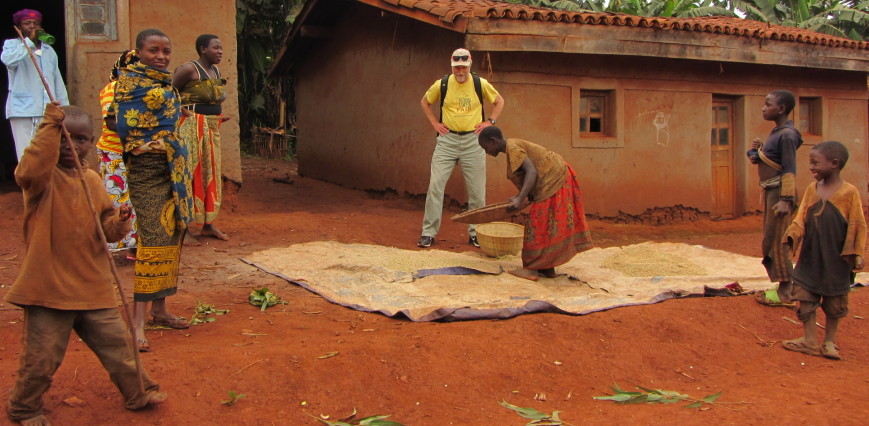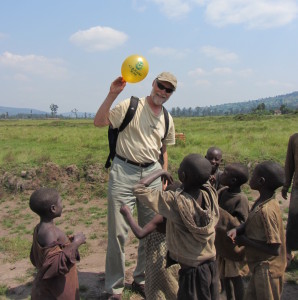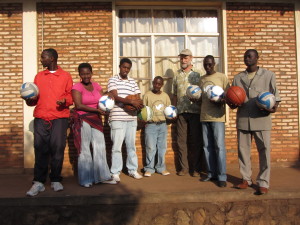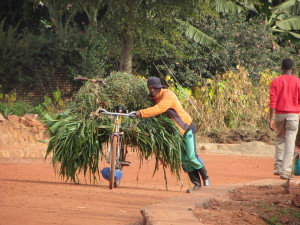
As political unrest continues in the war-torn East African country of Burundi, a Colorado State University professor is planning to travel there this summer to continue his work in educating a new generation of leaders in peace-building and sustainable development.
 After 40 years of genocide and civil war, during which a high percentage of Burundi’s educated citizens were targeted for exile or killed, the country is now in political turmoil because its president wants to serve a third term, which critics claim is contrary to the nation’s constitution. The situation escalated into a failed coup, and more than 20 people have died in anti-government protests, leading government officials to consider delaying the election scheduled for June 26.
After 40 years of genocide and civil war, during which a high percentage of Burundi’s educated citizens were targeted for exile or killed, the country is now in political turmoil because its president wants to serve a third term, which critics claim is contrary to the nation’s constitution. The situation escalated into a failed coup, and more than 20 people have died in anti-government protests, leading government officials to consider delaying the election scheduled for June 26.
Peace project
William Timpson, a professor in CSU’s School of Education, plans to be there July 10-24 to continue his work with faculty and students at the University of Ngozi, in hopes of ultimately creating a center focused on peace and reconciliation. The effort has been named the Amahoro Project, the Kirundi word for “peace.”
“We think people would be willing to come from around the world to study with those who survived all of this and are committed to a new way of functioning and operating,” Timpson said. “How do survivors of a civil war move forward in constructive ways?”
Joining Timpson will be Selden Spencer, a neurologist from Huxley, Iowa, who at Timpson’s urging successfully applied for Fulbright funding to support the trip. Timpson received a Fulbright Specialist Award in 2011 to support his work at the University of Ngozi.
“When I first went, they approached me and said, ‘We would like to be a laboratory for CSU, for your faculty to apply various ideas,’” Timpson said. “For instance, journalism may work one way here in Fort Collins, but what does it look like in a third-world country coming out of a conflict? Our students and faculty can get the benefits of being in an environment where they’ll be welcomed and have a chance to grow and learn in ways you could never do here as well as contribute to a new university’s growth and development.”
Relationship-building
At the University of Ngozi, Timpson and Spencer will work with Rector Apollinaire Bangayimbaga, who visited CSU last September on a relationship-building trip. His visit was part of an international memorandum of understanding signed in 2012 by the University of Ngozi and CSU’s School of Global Environmental Sustainability.
 Bangayimbaga co-authored a book with Timpson and George Mason University Professor Elavie Ndura titled Conflict, Reconciliation and Peace Education: Moving Burundi Toward a Sustainable Future, published by Routledge. He spoke to Timpson’s classes and met with CSU faculty and administrators during his campus visit.
Bangayimbaga co-authored a book with Timpson and George Mason University Professor Elavie Ndura titled Conflict, Reconciliation and Peace Education: Moving Burundi Toward a Sustainable Future, published by Routledge. He spoke to Timpson’s classes and met with CSU faculty and administrators during his campus visit.
“Apollinaire grew up in the humblest of circumstances, routinely walking the three-plus miles from his village to get water for his parents, but showed so much talent that he eventually was chosen for study in the seminary, entered the priesthood, and completed his Ph.D. in theology at the University of Madrid in Spain,” Timpson said. “His leadership of the University of Ngozi is truly remarkable, and now he wants his campus to serve as a kind of springboard for CSU faculty who want to build connections in the developing world.”
Teaching changes
Timpson’s work at the University of Ngozi involves transforming the country’s educational system from a traditional, hierarchical format of lectures and rote memorization to one that is based more on critical thinking, problem-solving and case- and project-based learning in small groups. At the fledgling university, which is 16 years old and only has about 1,700 students, the Amahoro Project aims to infuse the undergraduate fields of health, agriculture, communications, law, business and computer science with new curricula that emphasize content mastery and peace-building, including skills in conflict mitigation, negotiation and consensus-building.
“It’s a different kind of learning for students than sitting and taking notes,” Timpson said. “Transforming traditional educational practices is a slow process, but it feels like the thing that we should be doing. All of us live in this amazing bubble of privilege here at CSU, and these young people in Burundi have very little. Many of their families live in these mud and straw one-room and two-room homes, and they eke out a subsistence raising crops like beans and fruit.”
 “I’m always amazed and inspired when these young people find their way to the university,” he continued. “They have very few books, and there’s limited Internet access, but they carry on. For a lot of them, that’s all they know; they haven’t had the opportunity to travel much. So it feels like what a university like CSU ought to be doing, partnering with campuses that need a partnership in order to survive and prosper.”
“I’m always amazed and inspired when these young people find their way to the university,” he continued. “They have very few books, and there’s limited Internet access, but they carry on. For a lot of them, that’s all they know; they haven’t had the opportunity to travel much. So it feels like what a university like CSU ought to be doing, partnering with campuses that need a partnership in order to survive and prosper.”
Timpson noted that the region where the University of Ngozi is located managed to avoid much of the conflict that has plagued the rest of the country in recent decades, so part of his effort is to learn more about how they did it.
“Once the guns come out and the shooting starts, seemingly it spirals down quickly,” he said. “But in the Ngozi region they were able to keep that at bay, and they believe – and I believe – they have a special story to tell.”
The School of Education is in CSU’s College of Health and Human Sciences.